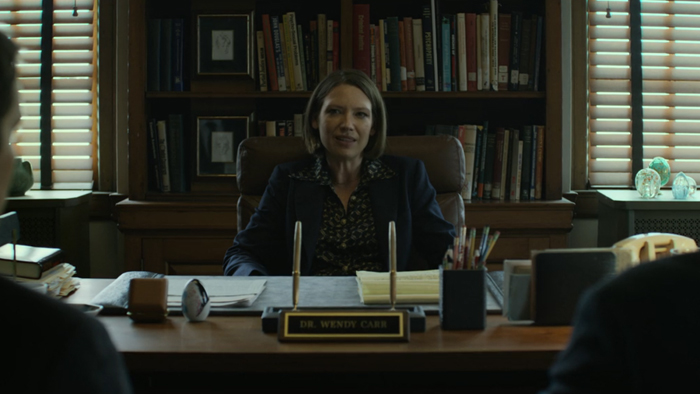First, let us establish, well and truly, definitively and absolutely, that Mindhunter is an excellent show, a crackerjack whirlpool of artifice and reality, masks and skin, tilted at a strange angle to disorient and confuse. We say this first and loud at the outset, because I value the frank dialogue between you and I, and would hope to never mislead you with a deceptive opening paragraph. Let my thesis stand: Mindhunter is a great show with a terrible name.
Two episodes in, and I have talked at some great and perhaps a bit tedious length about the larger picture of Mindhunter, with all of the self-satisfied grandiose language you might expect from a stalled and frustrated English major. Yes, these components are fascinating and yes, they make the experience rich and rewarding, but they frankly don’t mean a damn thing if episodically, the show doesn’t deliver. Ten is a lot of hours to dedicate to a joyless slog to a satisfying bigger picture. So let’s look at episode 3 not as a component piece, but as an individual episode.
In many ways, it works well as an isolated piece of media in a way that the first two couldn’t. We see Holden and Bill work together and apply the knowledge they’ve gained from talking to Kemper to actually solve a case and elicit a confession. It’s a deeply satisfying moment that bumps up against one of the greatest challenges Mindhunter faces – but more on that in a moment. Let’s get through this plot first. There are more conversations with Kemper and we see two things pretty clearly – Bill is good at pretending to like Ed until he is away from him, and Holden is developing a genuine affection for him. And finally, Holden and Bill and their brief conversations with hideous men (thanks, David Foster Wallace) are granted validity by the scholarship of Wendy – a sociologist who sees great value in their work beyond the relatively esoteric circle of law enforcement. She provides guidance and a third member of the team. And realistically, friends, that’s about it. It might be a bit of an overstatement to compare Mindhunter to a Mamet play, but it is, let’s be frank, hella chatty, without necessarily a great deal of action. Which will make it ideal for cerebral snobs like me, but less so to people who are looking for a more straight forward procedural. But this is something that is unavoidable. We cannot change it by talking about it, so let’s just move onto that problem I alluded to a couple of sentences ago. You remember the one.

Mindhunter is a nightmare that nevertheless is telling a largely true story. And yes, it is told through a certain dreamy, self-referential lens, but beneath all of that, there is historical precedent. And within that historical precedent is the idea of trying to make something that has become so absolutely commonplace to us that there are, I don’t know, 900 shows about it currently airing, seem alien again. How, at this point, do you make criminal profiling feel new? Feel exciting? Feel dangerous? It is, in many ways, an impossible task, and yet one that is pivotal to the nature of the show. There are effective moments; watching Bill and Holden feed off each other as they interrogate the guilty party in the local killing is actively thrilling. Groff and Holt McCallany have excellent chemistry and read each other beautifully. These scripted lines feel sudden, feel spur of the moment, like they are feeding off of each other’s momentum. Unfortunately, there are more moments where we are simply hearing, “this isn’t done. No one’s done this,” and forced to accept that as an indicator of revelation. If this sounds like a harsher critique than I have here to for lodged about the show, understand that I comprehend how impossible a task it is to make the familiar foreign. It is more commiseration than complaint. But it still warrants a mention.
Perhaps, however, the most fascinating part about Mindhunter, as it develops, is trying to get a solid read on Holden and his motivation. Yes, we assume he is talking to Kemper genuinely to try to attain new understanding and knowledge. Is that to help people? Is it for personal glory? Or is it, as I am coming to think increasingly, a desire to feel a connection with someone? Holden is a singular character. Bill vacillates from seeming wryly amused by him, to being utterly baffled, and largely irritated. There is no quantifiable chemistry or connection between him and his girlfriend – they have academic conversations, and the only time either seems particularly engaged with the other is when they are talking about Holden’s work. Holden, not unlike Kemper, not unlike any deviant, is on the fringes of society. He knows how to function and follow the rules, but not how to connect. And it is strangely aching and heartbreaking to watch him developing a rapport with Kemper. It can only end poorly.
Episode three feels very much like it’s place setting. We’ve had our first real victory and, in many ways, we’ve officially gotten the band together. It’s only going to get better (see: worse) from here!
